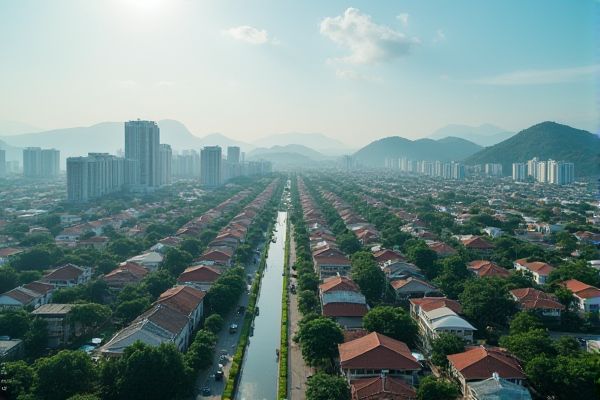
Why moving to Vietnam: Diverse culture and traditions. Affordable cost of living. Warm and tropical climate. Delicious Vietnamese cuisine. Friendly and welcoming locals. Thriving expat community. Exciting job opportunities. Rich historical landmarks. Stunning natural landscapes. Efficient healthcare system.
Diverse culture and traditions.
Vietnam offers a rich and diverse cultural landscape with 54 ethnic groups, each having their own unique customs, rituals, and practices, making it a vibrant tapestry of traditions that include vibrant festivals like the Lunar New Year (Tet) and a diverse cuisine. The country's cultural traditions are deeply rooted in its history, beliefs, and regional variations, providing a unique and enriching cultural experience. For more information, visit the Vietnam Culture Guide.
Affordable cost of living.
Vietnam offers a significantly affordable cost of living, allowing expats to enjoy a high standard of living at a fraction of the cost of Western countries. With expenses approximately 42.8% lower than in the UK and 63.5% lower than in the US, rent, utilities, and everyday essentials are very reasonable. For instance, options like a 3-bedroom house for around $467 per month, along with affordable services such as cleaning and laundry, make Vietnam an attractive destination for those seeking a low-cost lifestyle. As highlighted by International Living, a couple can enjoy a comfortable, middle-class lifestyle for less than $1,300 per month. Costs can be even lower outside of major cities like Hanoi and Ho Chi Minh City, where a budget of $800 to $1,100 per month can provide a lovely house, utilities, and other amenities.
Warm and tropical climate.
Vietnam offers a warm and tropical climate, with the Northern region experiencing a humid subtropical climate with four distinct seasons, while the Central and Southern regions have a tropical monsoon climate with two main seasons: rainy and dry, characterized by high temperatures and significant rainfall throughout the year. To learn more about the climatic conditions and average temperatures, the Vietnam Climate guide provides comprehensive insights into the weather patterns across different regions of the country.
Delicious Vietnamese cuisine.
Moving to Vietnam offers the opportunity to immerse yourself in a cuisine that is fresh, healthy, and light, characterized by a balance of sweet, sour, spicy, and cooling flavors, with staples like Pho, a national dish, and the widespread use of fresh ingredients, herbs, and fermented fish sauce. Vietnamese cuisine also reflects regional influences and historical impacts, such as French colonization, making it a rich and diverse culinary experience. Discover more about this vibrant culinary journey at An Introduction to Vietnamese Food.
Friendly and welcoming locals.
Moving to Vietnam is appealing due to the friendly and welcoming nature of its locals, who embody a deep-seated culture of hospitality known as "Tinh hieu khach." This ethos emphasizes respect, community, and the joy of shared experiences, making every interaction a meaningful and warm encounter. Vietnam is highly regarded for its welcoming locals, with a significant percentage of expats praising the friendliness shown towards them. This positive reception creates a favorable impact on their well-being, establishing the country as one of the world's most welcoming places.
Thriving expat community.
Moving to Vietnam is attractive due to its thriving expat community, with over 100,000 foreigners from more than 100 countries, particularly from China, Korea, Japan, Taiwan, and the United States, who find the country's sociability, hospitality, and rich culture appealing. For those considering this vibrant lifestyle change, Living in Vietnam: A Guide to Moving to Vietnam as an Expat offers invaluable insights and guidance. This comprehensive resource paints a vivid picture of how life unfolds in this culturally rich and welcoming nation, making it an essential read for prospective expatriates.
Exciting job opportunities.
Moving to Vietnam offers exciting job opportunities, particularly in the tech sector, with a projected revenue of $136 billion. There is a demand for 400,000 skilled professionals, and high demand for roles such as software developers, data scientists, and cybersecurity experts. The country is home to over 64,000 tech firms employing 1.2 million people, and key skills in AI, Big Data, and IoT are highly sought after. For more detailed insights into the growing tech job market in this vibrant country, visit the Coding Bootcamp Vietnam article.
Rich historical landmarks.
Moving to Vietnam offers the opportunity to immerse yourself in a rich historical landscape, with landmarks like the Imperial Citadel of Thang Long, a UNESCO World Heritage Site, and the Temple of Literature, which showcase the country's extensive cultural and architectural heritage. These sites, constructed over various historical periods, provide a deep insight into Vietnam's dynastic past, cultural influences, and significant historical events. For more details on these historical landmarks, you can visit the Historical Landmarks in Hanoi page. Exploring these locations enriches one’s understanding of the vibrant tapestry that makes up Vietnam's history.
Stunning natural landscapes.
Moving to Vietnam offers the opportunity to experience stunning natural landscapes, including towering mountains, pristine beaches, unique coastal landscapes, and diverse ecosystems such as the Mekong Delta and Phong Nha-Ke Bang National Park. For those passionate about nature, Vietnam is a haven, with its breathtaking scenery and rich biodiversity. To explore more about Vietnam's diverse and captivating ecosystems, visit this detailed guide on the Nature of Vietnam and plan your journey to discover these natural wonders.
Efficient healthcare system.
While Vietnam's healthcare system has made significant progress, particularly in urban areas and with advancements in technology and infrastructure, it still faces challenges such as hospital overcrowding, limited integration with primary healthcare, and inefficiencies in management and financing. However, the government is working to improve healthcare efficiency by shifting low-complexity services to primary care settings and enhancing governance and management structures. For more detailed information on this topic, visit the World Health Organization's Vietnam Hospitals page to learn more about ongoing efforts and improvements in the healthcare sector.
